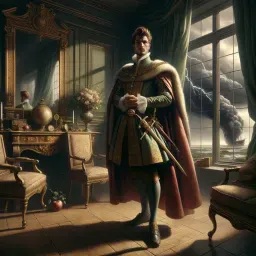It is a wise father that knows his own child

0
0
0
0
- Meaning
- At its core, the phrase reflects on the sometimes elusive nature of parenthood and understanding. The wisdom here pertains to truly recognizing one’s child—not just through external traits or everyday interactions but on a deeper, more intrinsic level. It speaks of an understanding that transcends superficial judgments and reaches into the child's true nature, potential, and individuality. In other words, it highlights the importance of a parent’s deep and insightful engagement with their child’s character and essence.
- Allegory
- The serene garden represents the nurturing environment essential for understanding a child's multifaceted character. The father's loving gaze symbolizes deep insight and wisdom, while the child's play reflects innocence and potential. The pond’s reflection illustrates the complex layers of the child's personality. Blooming trees and books symbolize growth and knowledge, reinforcing the themes of love, nurturing, and profound understanding in the parent-child relationship.
- Applicability
- In personal life, this phrase emphasizes the importance of parents taking time to truly understand their children. It encourages parents to go beyond the surface level interactions and to nurture a profound understanding of who their children are as individuals. This insight can foster better communication, establish stronger bonds, and help parents guide their children more effectively.
- Impact
- This phrase has had a lasting impact as it continues to be cited in discussions about parenting, wisdom, and family relationships. Shakespeare’s works have been studied extensively, and his quotes are often invoked in educational settings, literary discussions, and cultural references.
- Historical Context
- "The Merchant of Venice" was written between 1596 and 1599. The historical context of this phrase lies within the Elizabethan era, a period known for its robust cultural expression and the establishment of early modern English drama.
- Criticisms
- There are no significant controversies associated with this phrase itself, although some might argue it simplifies the complexity of parent-child relationships. Others could point out that understanding one's child might offer varying degrees of difficulty depending on numerous factors, including familial dynamics and individual personalities.
- Variations
- Different cultures manifest similar wisdom, asserting the importance of understanding within family relationships. For instance, in some Eastern philosophies, the family unit and the interdependence of its members are deeply respected, often stressing the importance of mutual understanding and empathy.
-

The empty vessel makes the loudest sound.
-

Journeys end in lovers meeting.
-

How poor are they that have not patience! What wound did ever heal but by degrees?
-

I am one who loved not wisely but too well.
-

I will praise any man that will praise me.
-

Some Cupid kills with arrows, some with traps.
-

There was never yet philosopher that could endure the toothache patiently.
-

I must be cruel only to be kind; thus bad begins, and worse remains behind.
-

The smallest worm will turn, being trodden on.
-

Come what come may, time and the hour runs through the roughest day.
No Comments